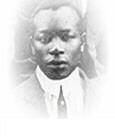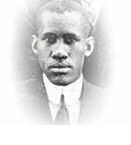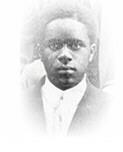



 |
 |
 |
On Saturday, October 8, 1913, on the campus of Howard University in Washington,
D.C., Distinguished Most Honorable Founder Abram Langston Taylor presented the
proposition of establishing a new fraternal organization to Distinguished Most Honorable
Founder Leonard F. Morse. Distinguished Most Honorable Founder Charles I. Brown was
invited to aid in this movement. Between these three men, they began their journey, creating
an international organization of college and professional men, in which in the Year of the Light,
on January 9, 1914, the permanent organization of Phi Beta Sigma Fraternity was effected.
With the creation of this new fraternity, the three Most Honorable Founders chose
nine of their associates to become members. These new members were: S.P. Massie, J.A.
Franklin, J.E. Jones, B.A. Mathews, W.F. Vincent, T.L. Austin, W.E.Tibbs, J.H. Howard,
and I.L. Scruggs. These men later became the charter members of the Alpha Chapter of Phi
Beta Sigma Fraternity at Howard University. The Board of Deans at Howard University
recognized the new fraternity on April 15, 1914 and the University Reporter, a student
publication at Howard University, made public of the fraternity a week later. The first
initiation was held on May 4, 1914 and from there Phi Beta Sigma Fraternity began to grow.
The fraternity was incorporated on January 31, 1920 and is now known as Phi Beta Sigma
Fraternity, Incorporated.
Founded upon the principles of Brotherhood, Scholarship, and Service, the fraternity
has grown to have brotherhood of over 105,000 members with over 700 campus and alumni
chapters throughout the continental United States, Switzerland, Europe, the Caribbean
Islands, and Africa. These three principles also exhibits the fraternity's motto: "Culture for
Service and Service for Humanity". Phi Beta Sigma consists of men dedicated to enhancing
great minds and promoting systematic fellowship, African-American freedom, justice, equal
rights, and service to the American communities. Being a social and service fraternity, Phi Beta Sigma has three National Programs,
Social Action, Education, and Bigger & Better Business,
in conjunction with other programs and organizations, that are concerned and
involved with meeting the needs of the community.
The greatness of Sigma is measured in its ideals and practices. Phi Beta Sigma believes
not only in the brotherhood of Sigma men, but it also believes in equal faith in the
brotherhood of all men.